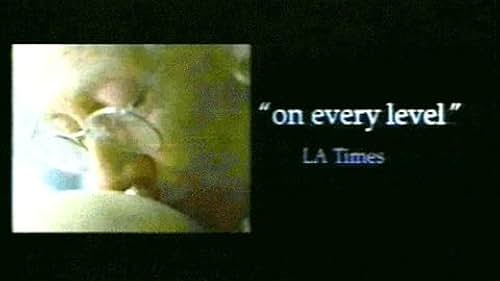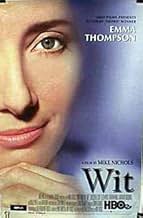A renowned professor is forced to reassess her life when she is diagnosed with terminal ovarian cancer.A renowned professor is forced to reassess her life when she is diagnosed with terminal ovarian cancer.A renowned professor is forced to reassess her life when she is diagnosed with terminal ovarian cancer.
- Won 3 Primetime Emmys
- 13 wins & 21 nominations total
- Nurse
- (as Su-Lin Looi)
- Fellow 1
- (as Harry Dillon)
- Director
- Writers
- All cast & crew
- Production, box office & more at IMDbPro
Storyline
Did you know
- TriviaThis movie is often shown at medical colleges as an example of how doctors and researchers should not behave.
- GoofsDuring her exam with the young internist, her arms alternate repeatedly from being completely under the sheet, to being folded together on top of the sheet.
- Quotes
E.M. Ashford: Do you think that the punctuation of the last line of this sonnet is merely an insignificant detail? The sonnet begins with a valiant struggle with Death calling on all the forces of intellect and drama to vanquish the enemy. But it is ultimately about overcoming the seemingly insuperable barriers separating life death and eternal life. In the edition you choose, this profoundly simple meaning is sacrificed to hysterical punctuation.
E.M. Ashford: And Death, Capital D, shall be no more, semi-colon. Death, Capital D comma, thou shalt die, exclamation mark!
E.M. Ashford: If you go in for this sort of thing I suggest you take up Shakespeare.
E.M. Ashford: Gardner's edition of the Holy Sonnets returns to the Westmoreland manuscript of 1610, not for sentimental reasons I assure you, but because Helen Gardner is a scholar.
E.M. Ashford: It reads, "And death shall be no more" comma "death, thou shalt die." Nothing but a breath, a comma separates life from life everlasting.
E.M. Ashford: Very simple, really. With the original punctuation restored Death is no longer something to act out on a stage with exclamation marks. It is a comma. A pause.
E.M. Ashford: In this way, the uncompromising way one learns something from the poem, wouldn't you say? Life, death, soul, God, past present. Not insuperable barriers. Not semi-colons. Just a comma.
- SoundtracksSerenade Adagio
String Quartet #15 (2nd Movement)
Written by Dmitri Shostakovich (as Dimitri Shostakovitch)
Performed by The Manhattan String Quartet
Courtesy of Ess.a.y Recordings
By Blake French:
"Wit" is one of the most personal stories of terminal illness that I can remember. Most of the movie takes place behind hospital doors where the film's main character is tested and treated for advanced stages of ovarian cancer-that may be the reason that it was released straight to cable TV instead of getting a much deserved theatrical release. Do not let the depressing themes stop you from viewing "Wit," it is thought-provoking, riveting, unforgettable-one of the best movies of the year.
The film is directed by Mike Nichols (whose most memorable work is the original classic, "The Graduate"). He is at the top of his game here, vividly focused and, working for a script by himself and Emma Thompson, uses a narrative of the first person. The main character, a strict professor of poety in her upper forties named Vivian Bearing, often talks directly to the camera, incorporating a straightforward point of view as she shares her personal feelings directly. This gives the movie a personal dimension, and the soundtrack, consisting of memorable classical music, contributes to the penetrating power of this superb motion picture.
Since the production never had a theatrical release, it will not be eligible for Academy Awards next March. That is a shame, because the work by Emma Thompson is more invigorating, emotional, and involving as anything we are likely to see this year. She delivers a performance of awe-inducing empathy, doing something many actresses would have trouble dealing with. She plays a tough individual, both physically and emotionally, but, as the movie's clear irony proves, even the strongest people have a breaking point, and when she reaches hers, she loses confidence in her past and current strengths. Thompson is heartbreaking and vivid, creating one of the most convincing and noteworthy characters in a long time.
Christopher Lloyd plays Dr. Harvey Kelekian, the person in charge of Ms. Bearing's treatments. It is clear this man is more concerned about the results of the tests then the actual person being tested. Bearing becomes a mere guinea pig, and as she states in one of the movie's most powerful scenes, she is unbearably ill not because he has advanced stages of ovarian cancer, but because she is being treated for advanced stages of ovarian cancer. It is the actual treatments that are a threat to her health. Eileen Atkins plays a sympathetic nurse who sees Bearing as more than just a patient, but a person. Jonathan M. Woodward delivers a powerful performance as another hospital worker more interesting in numbers than people.
"Wit" is a powerful, harrowing movie not to be missed. It aired on HBO about a week ago and will continue running for a while, until finally reaching home video. Check you local TV listing for show times, or wait for the video release. This movie has a place on my list of the top ten movies of the year, and for you to miss such an influential picture would be a crime.
Details
- Runtime1 hour 39 minutes
- Color
- Sound mix
- Aspect ratio
- 1.85 : 1
Contribute to this page






















